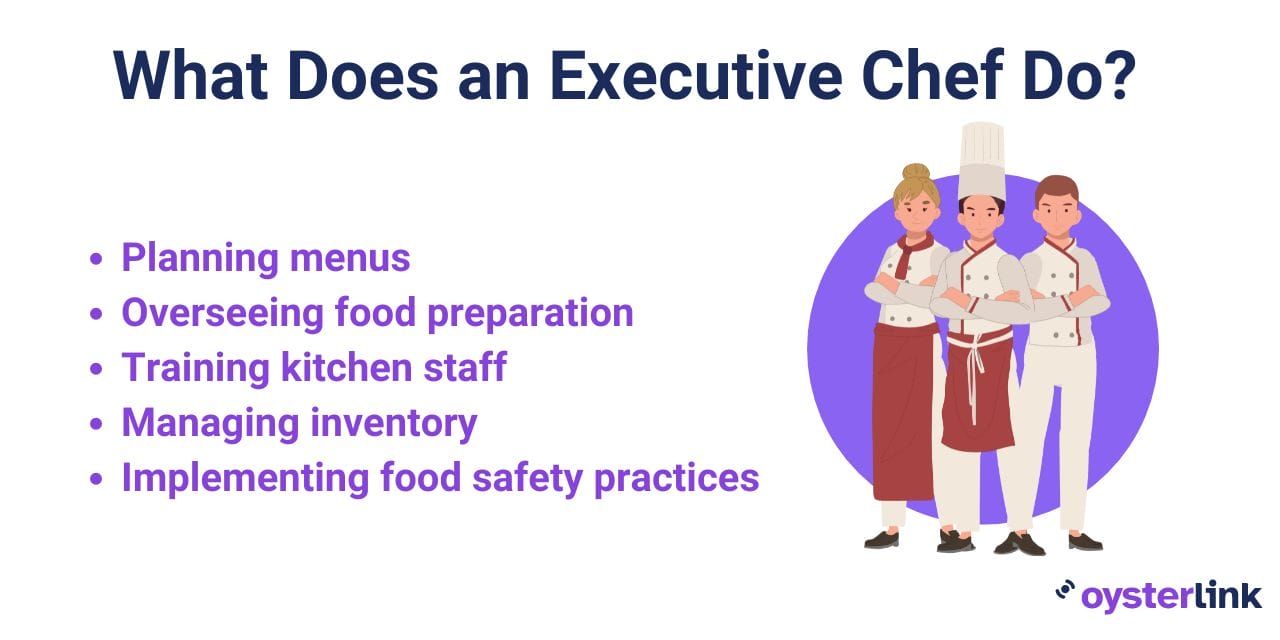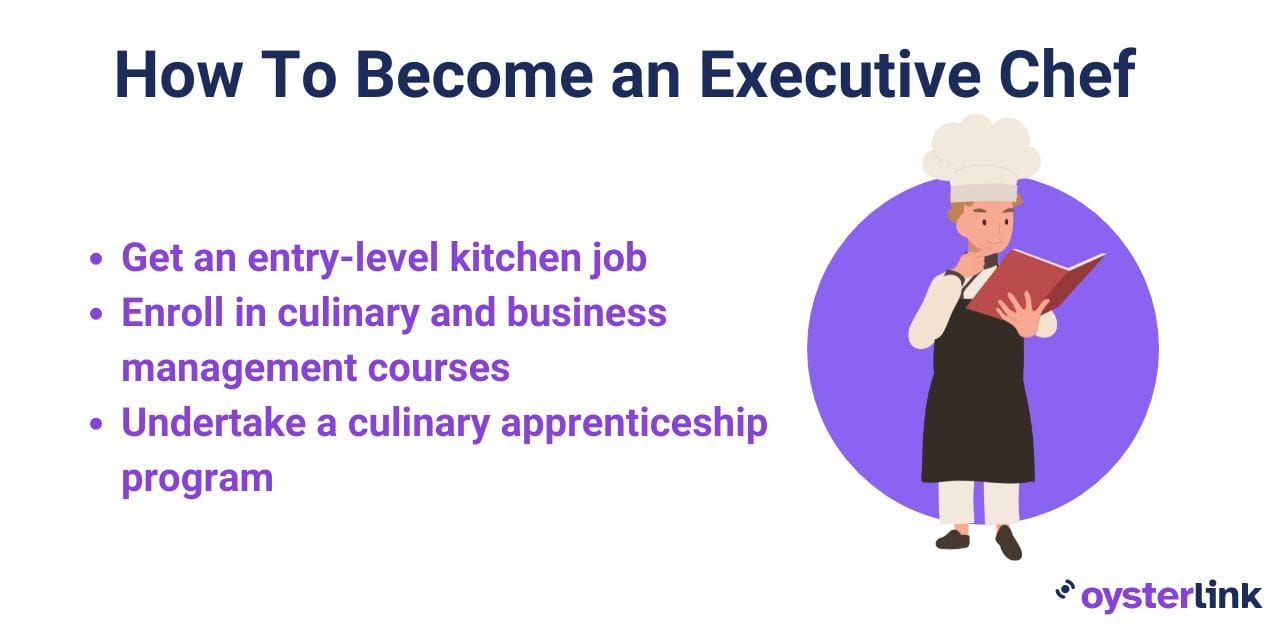Guide to an Executive Chef Career
Pursuing a career as an Executive Chef takes several years of developing culinary, leadership and business skills. This is because restaurants, hotels and catering companies rely on Executive Chefs to increase their profit, maintain an excellent reputation and ensure the health and safety of customers.
If you're aspiring to be at the top of the kitchen hierarchy, this guide offers a deep dive into the required skills and knowledge, daily duties and responsibilities and salary potential of an Executive Chef.
What Does an Executive Chef Do?
An Executive Chef is responsible for developing menus, overseeing staff and supervising food preparation.
Below are some of the duties and responsibilities often found in an Executive Chef job description.
- Planning menus: Collaborating with the Restaurant Manager to identify the theme of the restaurant and align the menu based on the cuisine and target audience
- Overseeing food preparation: Supervising Line Cooks, Prep Cooks and Sous Chefs in preparing, cooking and plating dishes
- Training kitchen staff: Teaching the latest culinary techniques and cooking methods to ensure the quality of food
- Managing inventory: Developing systems to track ingredients, place orders and receive deliveries efficiently
- Implementing food safety practices: Ensuring the kitchen staff is properly trained in food safety practices and implementing rules to avoid food safety hazards

Top 3 Skills of Outstanding Executive Chefs
These skills and qualities are important for Executive Chefs to achieve their goals.
1. Culinary expertise
Even though you'll be spending the majority of your time in the office ordering supplies, researching and developing new menus and hiring personnel, you'll still need culinary expertise to know how to set and maintain quality standards.
Consistency in food quality boosts your establishment's reputation, helping build customer loyalty and attracting new ones. In addition, you'll also be training kitchen staff. Having excellent cooking skills and knowledge makes mentoring easier and more efficient.
2. Business acumen
There are many components to business acumen. One of them involves strategic thinking. Strategic thinking includes being able to identify long-term goals and steps to achieve them.
For example, an Executive Chef's goal is to increase the restaurant's revenue. To do this, the Executive Chef can suggest a menu that features seasonal ingredients to lower costs. Then, together with the Restaurant Manager, they can set competitive food prices to increase profitability.
3. Knowledge of food safety standards
Executive Chefs must be knowledgeable in food sanitation rules to ensure the safety of the customers and maintain the establishment's reputation.
The Center for Disease Control shares that 48 million people in the United States get sick due to foodborne diseases. This statistic highlights the importance of implementing food safety protocols to avoid legal issues and reputational damage.
How To Become an Executive Chef
The path toward becoming an Executive Chef requires a combination of formal education and professional experience.
From securing entry-level kitchen jobs and enrolling in culinary and business management courses to undertaking apprenticeships, below are steps to climbing the top of the kitchen hierarchy.
Get an entry-level kitchen job
Executive Chefs usually start in an entry-level job in the kitchen such as a Server or a Dishwasher. If you have any culinary experience, you may skip these roles and get a basic Chef position instead.
In an exclusive interview we did with Chef and entrepreneur Gustavo Montes, he said that starting his career as a Dishwasher helped him set a realistic view of what it's like working in the culinary industry. Gaining experience through an entry-level kitchen job gives you a glimpse of how things work in a fast-paced settings, assisting you in deciding if this career is for you.
In addition, starting from the bottom teaches you how to empathize with junior workers. Being able to relate especially with younger workers who are prone to making mistakes is important in fostering a healthy kitchen environment.
Enroll in culinary and business management courses
Taking courses that combine teaching culinary techniques and business management equips you with all the necessary skills required to be a successful Executive Chef in a short amount of time.
In the same interview with Chef Gustavo Montes, he mentioned how culinary school has been helpful in his career growth.
"Culinary school exposed me to a new world of techniques and flavors that I wouldn't have discovered as quickly otherwise. It offers immersion in various cuisines, unlike the limited creativity you might experience in one restaurant. Looking back, I'd recommend culinary education without hesitation," he said.
If you're looking for institutions that offer degrees in culinary arts and business management, consider the ones listed below.
Undertake a culinary apprenticeship program
Apprenticeship programs help you prepare for working in a wide range of culinary settings such as fine dining restaurants, large-scale banquets and hotels.
Most of them provide 4,000 hours of on-the-job training under the supervision of established Chefs. Below are some of the colleges that offer culinary apprenticeship programs:

Salary and Earning Potential of Executive Chefs
Executive Chefs in the U.S. earn an average base salary of $80,040 annually. This tends to differ according to location, type of establishment they're working in and experience level.
This map is interactive. Hover your mouse over different parts of the map to see detailed data.
Since the role of an Executive Chef is a leadership position, they have the potential to earn significant bonuses either through profit-sharing plans or employee bonuses.
Alternative Careers for Executive Chefs
Executive Chefs have a variety of careers they can explore given their skills and knowledge. Below, we've listed some of the popular alternative positions you can pursue.
Restaurant owner
As a culinary professional who's also armed with business skills, you can easily set up your own restaurant.
Aside from having 100% control over executive decisions, being a restaurant owner also brings greater fulfillment knowing you built something from scratch. Succeeding as an entrepreneur also allows you to leave a legacy that can be passed down to future generations.
Private Chef
If you love working for a client but would appreciate skipping administrative tasks and personnel management, being a Private Chef is an ideal role for you. Private Chefs earn competitive salaries with the average base being $68,493 per year.
Culinary teacher
Part of your job as an Executive Chef is sharing your knowledge and techniques learned with your kitchen staff. If you find yourself passionate about helping people grow and want to take this a step further, you can obtain a teaching Chef certificate and get a job as a teacher in an established culinary school.